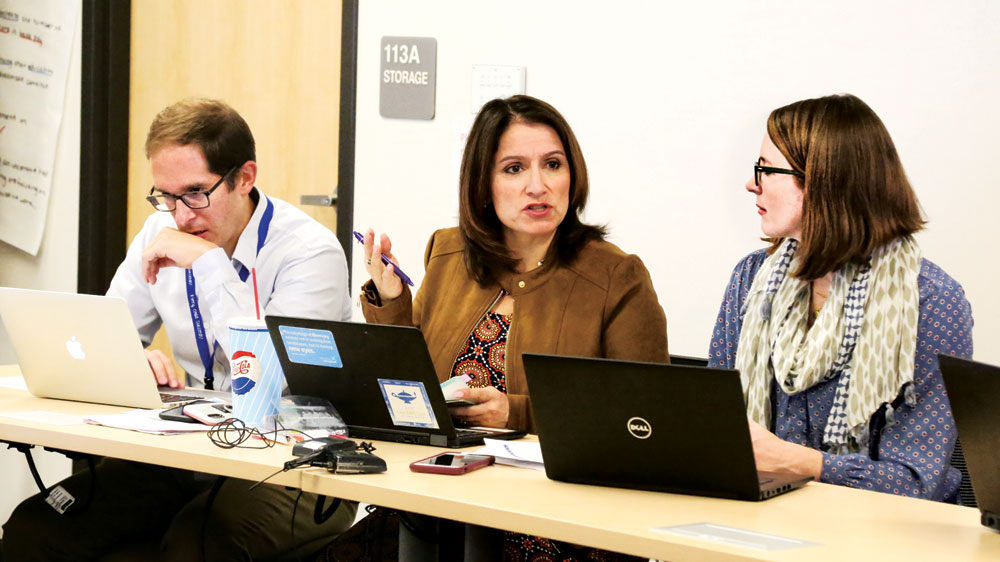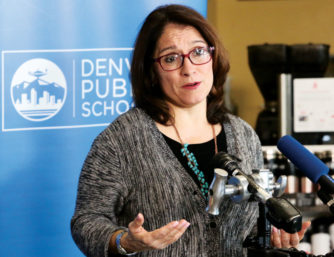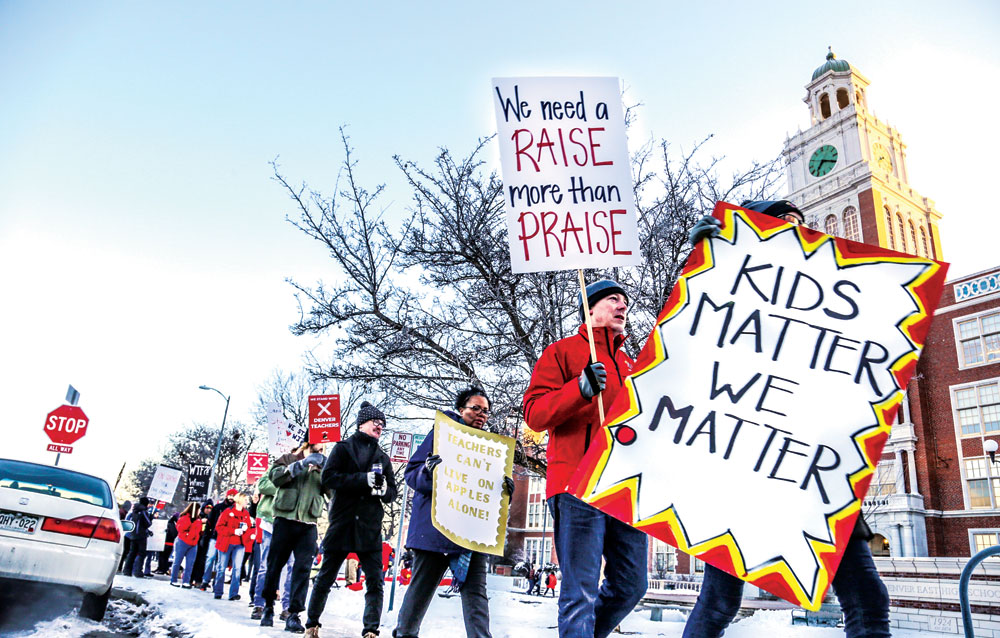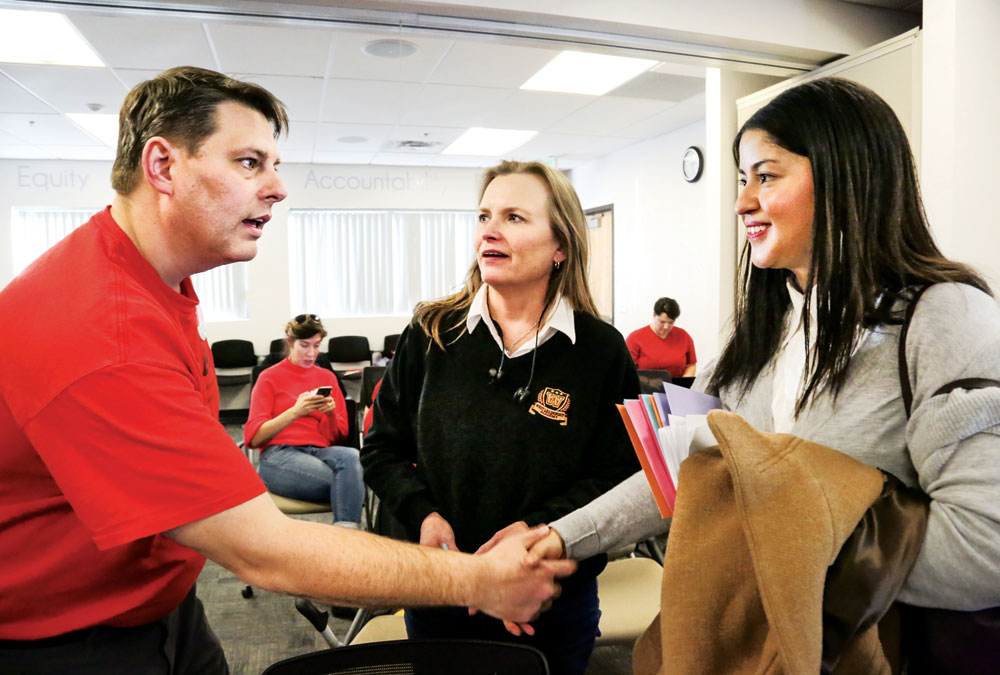
A month after DPS Superintendent Susana Cordova was confirmed, her new job took her to the negotiating table to settle a teachers’ strike. Pictured to her left is Mark Ferrandino who most recently served DPS as Deputy Superintendent of Operations and prior to that as Chief Financial Officer. To Cordova’s right is Michelle Berge, Denver Public Schools’ Legal Counsel.

Susana Cordova speaking at a press conference at DPS offices during the teachers’ strike in January 2019.
By many accounts, DPS Superintendent, Susana Cordova, was a star, a real Cinderella story—daughter of DPS secretary becomes first bilingual Latina to lead the district. She came up under Michael Bennet and Tom Boasberg, two reformers who focused on testing, competition, and accountability. They put the majority onus on principals—not the union. They shut down underperforming schools and fired less-than-satisfactory teachers. They embraced competition, opened 65+ new schools and created SchoolChoice. It was a system that, despite catapulting DPS from one of the worst urban districts to the middle of the pack, still lost favor with voters.
Cordova Appeared To Be Weathering the Storms
As Cordova was being ushered in as superintendent, so was a new political landscape being reflected in a flipped-majority, union-backed DPS Board that has a renewed focus on kids on the wrong side of the achievement gap. By many measures, Cordova weathered the shift well. In her first month she successfully negotiated a strike. By thinning out a top-heavy administration and reallocating funds, she gave teachers the biggest pay raise in Colorado history. She shifted away from her predecessor’s paternalistic style and immersed herself in the community, focusing primarily on equity. When activist groups accused the district of educational segregation, Cordova acknowledged the existence of systemic racism. According to Board records and news accounts, Cordova went along with numerous Board priorities. When the Board wanted to save—not shut down—poorly-performing schools, she did not argue. She supported their decisions to reunify Montbello and West High School, both of which had been dismantled under her former boss; she supported the resolution for all-gender bathrooms; and she supported ending the district’s contract with the Denver Police Department. She appeared to be a good team player—which makes it difficult to understand exactly—what went wrong that caused Cordova to resign?

Striking teachers carry signs as they picket in front of Denver East High School in Jan. 2019
The Board Didn’t Set Clear Performance Goals
The Board’s failure to articulate a vision beyond the expiring Denver Plan 2020 left the district without a clear direction. They acknowledge they neglected to set formal goals for Cordova’s evaluation and instead directed her to focus on Covid-19. Though the Board’s vision and goals in Cordova’s evaluation weren’t clearly identified, they did seem to call for cooperation over competition, a holistic approach over standardized testing, and a focus on transparency, equity, and social/emotional development.
Van Schoales, President of A+ Colorado, believes the evaluation of Cordova and the Board’s lack of transparency about it holds clues to her sudden departure, saying “The Board is hiding behind the average score.” He tweeted, “Something doesn’t add up…. If ALL DPS Board supported Cordova then why “3” on her eval? Let’s see each DPS board member eval of Cordova. Can we at least be honest?”

The teachers’ union lead negotiator Rob Gould shakes hands with DPS Board Member Angela Cobián during a break at the strike negotiations. Behind them is Board Member Carrie Olson.
The Board’s Evaluation Is Critical of Cordova’s Staff Selections
The evaluation says the Board values having a “homegrown” superintendent, but also says they are shifting away from the reform narrative. It goes on to say “her senior team is…too attached to the direction of the former administration” as many “served in senior positions for the last superintendent” and the Board is concerned there’s “a lingering collective mindset.” It later states Cordova’s new hires, “may not be the people she needs, or the people who know the school communities deeply.” They “encourage [her] to reflect…and consider such reflections in her managerial conversations…as it may be necessary to reorganize and eliminate redundancies.” The evaluation ends by promising Cordova will have, “a constructive friend in the Board of Education if she addresses the key opportunity areas.”

DPS Board members pose with Superintendent Susana Cordova for a photo posted on the Board’s website. Clockwise from front left: Jennifer Bacon, Barbara O’Brien, Carrie Olson, Bradley Laurvick, Angela Cobián, Susana Cordova, Scott Baldermann, Tay Anderson.
This Author’s Takeaway
Does this indicate Cordova’s biggest sin is that her roots are planted in a Boasberg administration? The Board seems willing to overlook this flaw in her DNA as long she’s willing to join their burn-the-house-down approach to revamping Denver education.
It is this author’s impression that the bulk of the evaluation reads like a call to action for Cordova to fire her top staff. It appears that majority members on the Board want to take bold steps into the future, but not before they burn any bridges that may connect them to the reforms of the past. You’re either with us or against us they seem to say, as they hand Cordova a match to join them in burning down the past.
Cordova—instead of scorching the very earth from which she came—handed back the match, declined the Board’s friendship, and officially closed the book on her 31-year career in DPS as she accepted a new position in Dallas. With a Board evaluation that said her senior team is too attached to the former administration, is it any surprise that two top members of her team, Mark Ferrandino and Jennifer Holladay, also resigned?
So, what’s next for DPS?
Will the Board find someone willing to strike the match? Schoales says it’s unlikely. “Especially if you’re talking about traditionally-qualified candidates, it’s hard to imagine someone new saying, ‘OK, you guys run this.’ I don’t know what kind of fantasy world they’re living in.”
Vernon Jones, Executive Director of Northeast Denver Innovation Zone, isn’t necessarily opposed to abolishing parts of the current system, but says,“We don’t need someone who thinks burning the house down is an accomplishment. An abolitionist isn’t someone who simply destroys,” but “one who dreams and builds something new. You’ve gotta live somewhere.” He pushes back on the idea the bench isn’t deep. “White supremacy and dominant-culture ideology have shaped who we think is qualified. Who the community says is qualified might be something else.”
The Board’s commitment to community input guarantees the public will have a say in who will be the next superintendent. Board Vice President Jennifer Bacon, says they’re looking into new and innovative ways to include the community in the vetting process and are drafting a new vision and job description for the superintendent position, both slated for release in January 2021.


Is this an editorial piece? Where are the facts? Lots of opinions and guessing by the writer.